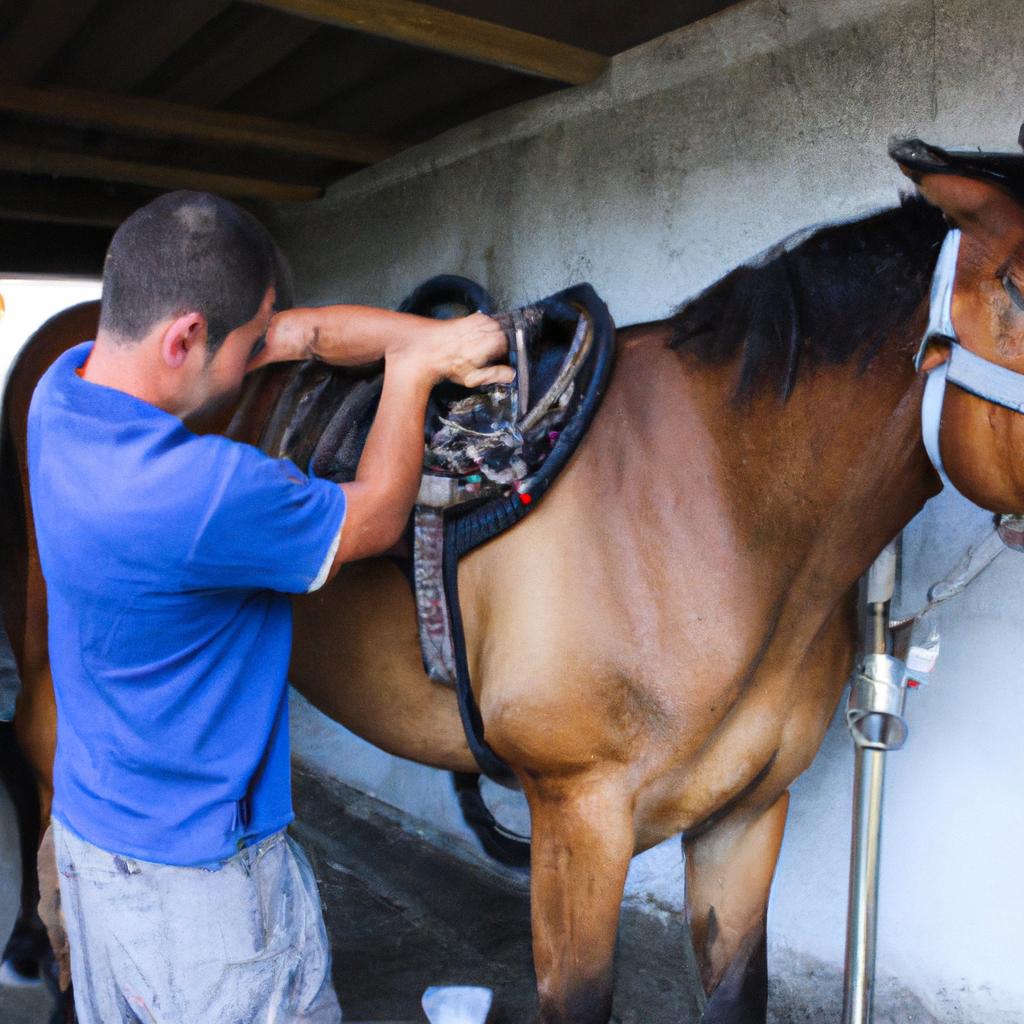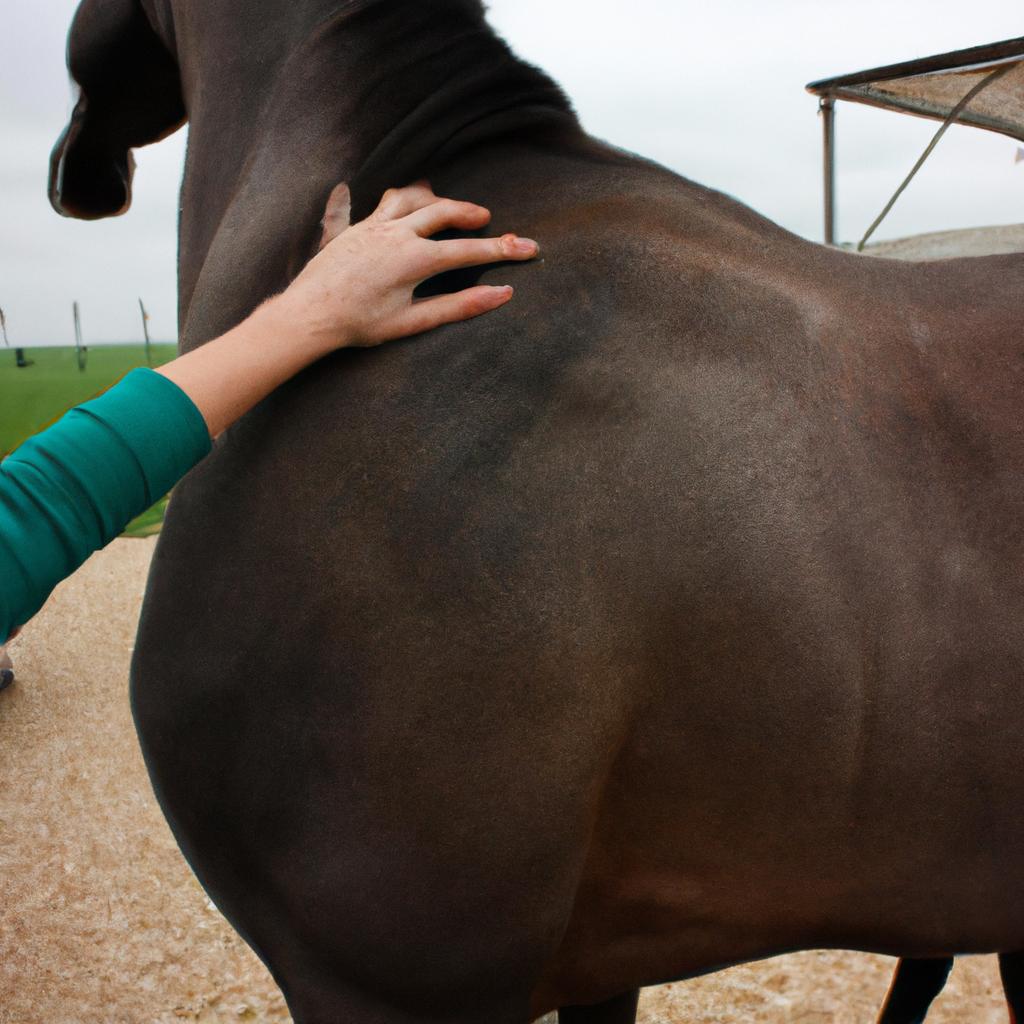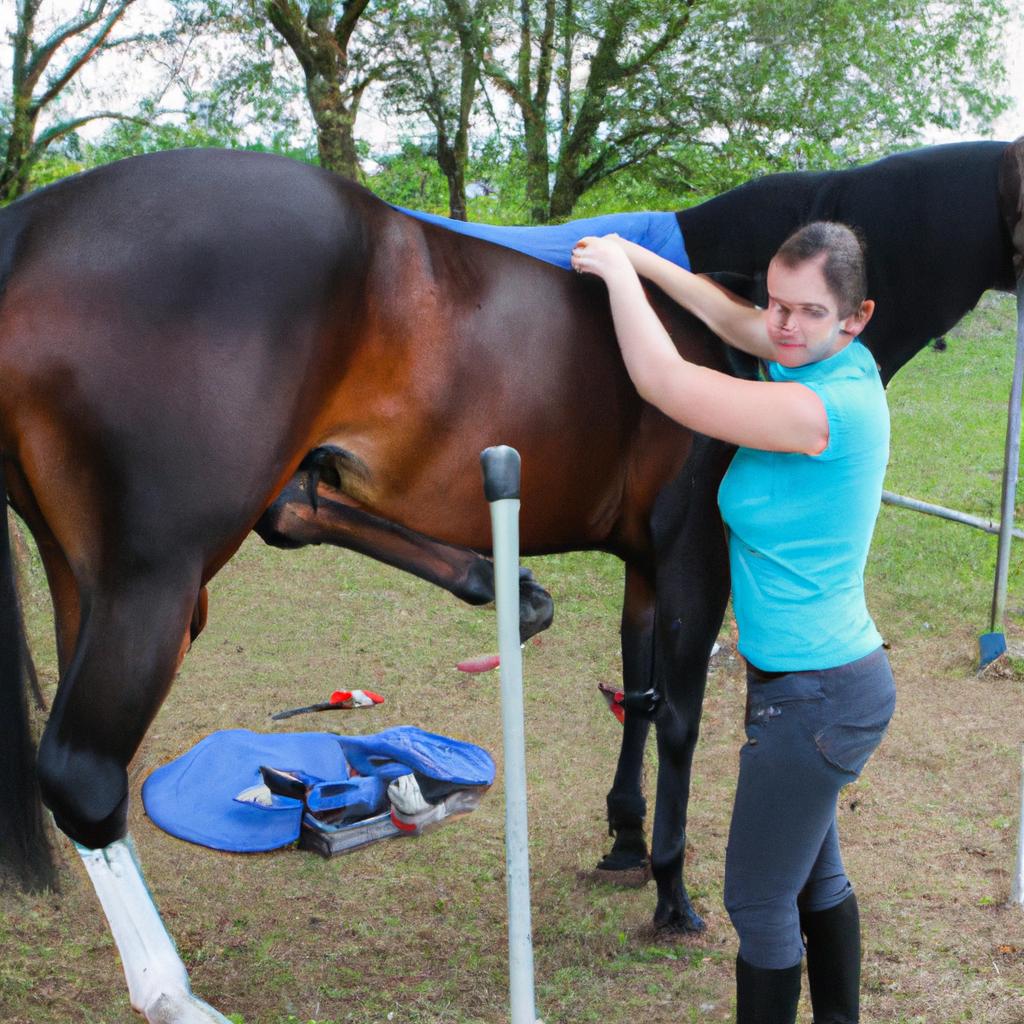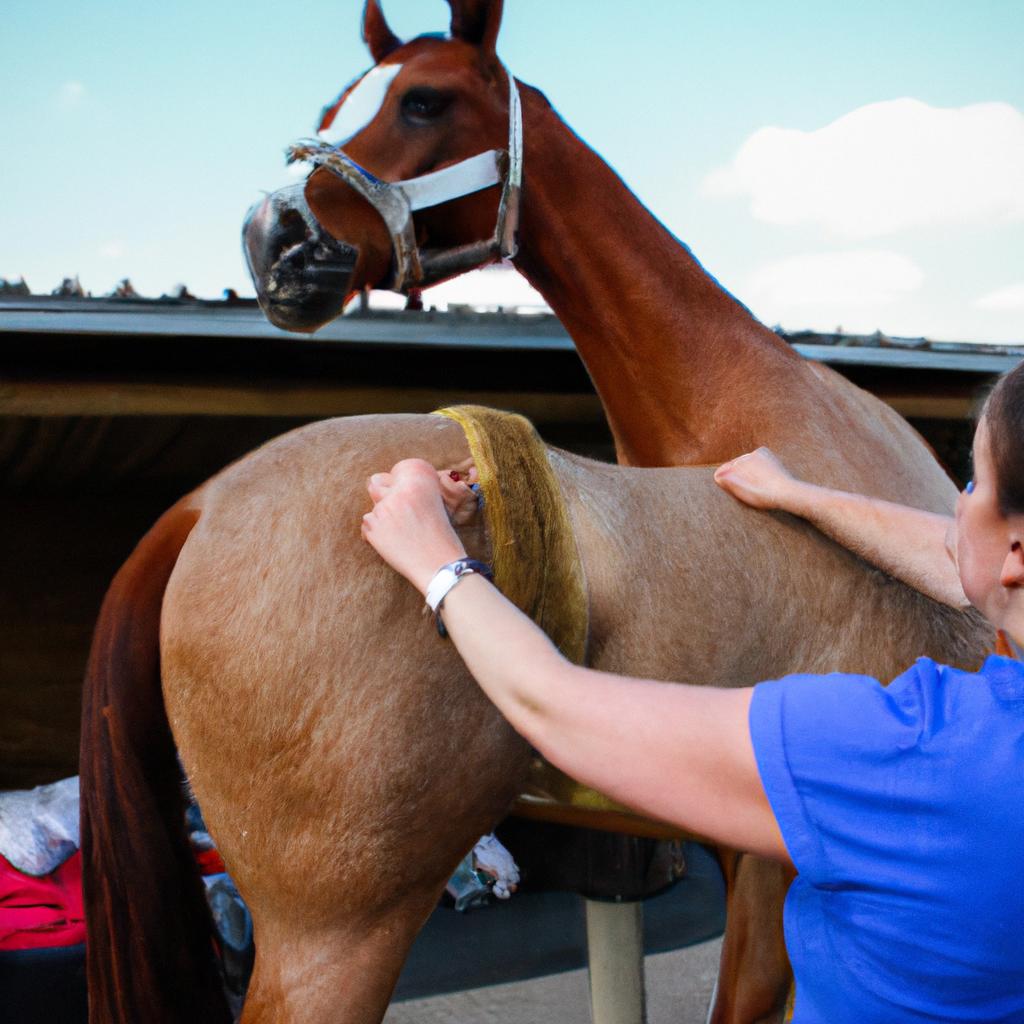Equine chiropractic care has gained significant popularity in recent years as horse owners recognize the benefits of this alternative therapy. However, finding a qualified equine chiropractor can be a daunting task, given the lack of standardized certifications and training programs specific to this field. Without proper credentials and expertise, there is an increased risk of ineffective treatments or even potential harm to the animal.
For instance, imagine a scenario where a racehorse owner seeks out an equine chiropractor to address the horse’s persistent back pain. Despite investing time and money into multiple treatment sessions, there is no improvement in the horse’s condition. This unfortunate outcome could have been avoided if the owner had thoroughly researched and chosen a properly trained professional with verified qualifications in equine chiropractic techniques.
To ensure that horses receive safe and effective chiropractic care, it is essential for horse owners to understand the certifications and training requirements specific to this specialized area. This article explores various aspects related to finding a qualified equine chiropractor, including available certifications, recognized training programs, and industry standards. By understanding these factors, horse owners can make informed decisions when selecting an equine chiropractor for their beloved animals’ well-being.
Understanding Equine Chiropractic
Imagine a horse named Bella, who has been experiencing stiffness and discomfort in her back. Despite regular exercise and veterinary care, Bella’s condition does not improve. In such cases, equine chiropractic treatment can be a valuable solution. Equine chiropractic is a branch of alternative medicine that focuses on the diagnosis and treatment of musculoskeletal disorders in horses through manual adjustments.
To better comprehend equine chiropractic, it is crucial to understand its principles and techniques. The practice revolves around the concept that misalignments or restrictions in the spine can hinder the nervous system’s proper functioning, leading to various health issues in horses. By performing precise manipulations along the spinal column, an equine chiropractor aims to restore normal motion and alignment within the joints, thus promoting overall well-being.
It is important for horse owners to recognize when their animals may benefit from chiropractic intervention. Here are some common signs indicating potential musculoskeletal problems:
- Decreased performance: If a once agile and energetic horse starts showing decreased athletic abilities or struggles with specific movements.
- Changes in behavior: Horses with underlying musculoskeletal issues might exhibit behavioral changes like irritability or resistance during riding or grooming sessions.
- Uneven gait: Lameness or irregularities in movement patterns could indicate muscle imbalances or joint dysfunctions.
- Difficulty engaging hindquarters: Issues related to core strength and hindquarter engagement can affect balance and impede performance.
To gain further insight into these signs and symptoms, refer to the following table:
| Sign | Description |
|---|---|
| Decreased Performance | A decline in athletic ability, reduced range of motion |
| Behavioral Changes | Irritability, unwillingness to be saddled/mounted |
| Uneven Gait | Limping/lameness while walking/running |
| Hindquarter Problems | Struggles with transitions, difficulty engaging hindquarters, loss of impulsion or collection |
Understanding these indicators can help horse owners identify when their equine companions may benefit from chiropractic care. In the subsequent section, we will delve into the importance of certifications and training in ensuring that you find a qualified equine chiropractor for your horse’s needs. By considering these factors, you can ensure that Bella receives the best possible care to address her musculoskeletal issues effectively.
Importance of Certification and Training
Equine chiropractic is a specialized field that focuses on the diagnosis, treatment, and prevention of musculoskeletal disorders in horses. Just like humans, horses can experience back pain, joint stiffness, and muscle tension that can affect their overall performance and well-being. For example, consider a hypothetical case where a competitive show horse named Bella starts showing signs of discomfort during training sessions. Her rider notices that she has difficulty bending to one side and seems reluctant to engage her hindquarters.
To address Bella’s issues, it becomes necessary to find a qualified equine chiropractor who possesses the knowledge and skills required for effective treatment. When searching for such professionals, there are certain certifications and training programs that should be considered:
-
Certified Animal Chiropractor (CAC): Look for practitioners who have completed an accredited certification program specifically focused on animal chiropractic care. These programs often require candidates to have prior education or experience in veterinary medicine or human chiropractic before becoming eligible.
-
Additional Veterinary Training: Some equine chiropractors may also hold advanced degrees in veterinary medicine or other related fields. This additional expertise allows them to better understand the underlying physiological processes involved in diagnosing and treating musculoskeletal conditions in horses.
-
Continuing Education: Due to advancements in research and techniques within the field of animal chiropractic care, it is important to choose a practitioner who actively participates in continuing education courses. Regularly attending relevant seminars and workshops enables these professionals to stay updated with the latest practices and provide optimal care for their patients.
-
Professional Associations: Consider equine chiropractors who are members of recognized professional associations dedicated to promoting high standards of practice within this niche specialization. Being affiliated with reputable organizations indicates a commitment towards ongoing learning and adherence to ethical guidelines.
It is crucial to prioritize finding a qualified equine chiropractor as incorrect adjustments or inadequate understanding of horse anatomy can potentially cause harm instead of providing relief. By ensuring that the chosen practitioner has the necessary certifications and training, horse owners can trust in their ability to accurately diagnose and effectively treat musculoskeletal issues.
Next section: Recognized Equine Chiropractic Associations
Recognized Equine Chiropractic Associations
Case Study:
To illustrate the significance of certification and training when choosing an equine chiropractor, consider the following hypothetical scenario. A horse owner named Sarah notices that her horse, Bella, is showing signs of discomfort while being ridden. Concerned for Bella’s well-being, Sarah decides to seek the help of an equine chiropractor to address any potential musculoskeletal issues.
Paragraph 1:
Certification and extensive training are crucial factors to consider when selecting an equine chiropractor. These qualifications ensure that practitioners possess the necessary knowledge and skills to provide effective treatment for horses. Equine chiropractors who have completed accredited programs undergo rigorous education focused on anatomy, physiology, biomechanics, neurology, diagnosis techniques, and appropriate adjustment methods specifically designed for horses.
In addition to formal education, ongoing professional development is essential for equine chiropractors to stay updated with current research and advancements in their field. This commitment demonstrates a dedication to providing high-quality care based on evidence-based practices. By seeking out certified professionals with continuous learning habits, horse owners can be confident in receiving optimal treatment outcomes for their animals.
Bullet Point List (Emotional Response):
When considering the importance of certification and training in equine chiropractic, keep these points in mind:
- Properly trained professionals minimize risks associated with adjustments.
- Certified specialists understand the unique anatomical structures and physiological characteristics specific to horses.
- Accredited courses equip practitioners with comprehensive knowledge about various conditions affecting equines.
- Ongoing education ensures practitioners stay informed about new developments within the field.
Table (Emotional Response):
| Benefits of Certification & Training |
|---|
| Minimizes risk during adjustments |
| Specialized understanding of equine anatomy |
| Comprehensive knowledge on various conditions |
| Continual learning keeps up-to-date |
Paragraph 2:
Recognizing the importance of certifications allows horse owners to make informed decisions when selecting an equine chiropractor. By verifying a practitioner’s qualifications, individuals can have confidence in their expertise and ability to provide appropriate care for their horses. This assurance fosters trust between the owner and the chiropractor, enhancing the overall treatment experience.
Moreover, working with certified professionals may lead to better treatment outcomes. These practitioners possess specialized knowledge of equine anatomy, enabling them to accurately diagnose and address musculoskeletal issues specific to horses. With this level of understanding, they can tailor adjustments and therapeutic plans based on each individual animal’s needs.
Understanding the significance of certification and training is just one aspect of finding a qualified equine chiropractor; however, it forms a solid foundation upon which other essential factors can be evaluated. In the subsequent section, we will explore additional qualifications that horse owners should look for when choosing an equine chiropractor.
Qualifications to Look for in an Equine Chiropractor
For horse owners seeking the services of a qualified equine chiropractor, it is essential to understand the certifications and training required for this specialized field. Recognized equine chiropractic associations play a crucial role in ensuring practitioners meet certain standards. One such association is the American Veterinary Chiropractic Association (AVCA), which provides certification programs for veterinarians and chiropractors interested in practicing animal chiropractic care.
To illustrate the importance of recognized associations, let’s consider a hypothetical case study involving a horse named Bella. Bella was experiencing difficulty with her gait, showing signs of lameness and stiffness. Her owner decided to consult an equine chiropractor who claimed expertise in treating musculoskeletal issues in horses. Unfortunately, after several sessions with this practitioner, there was no improvement in Bella’s condition. Frustrated by the lack of progress, Bella’s owner contacted the AVCA for guidance and discovered that the chiropractor they had been seeing was not certified or affiliated with any recognized association.
When searching for a qualified equine chiropractor, it is vital to look for specific qualifications that demonstrate their expertise and commitment to professional development. Here are some key qualifications to consider:
- Certification from recognized associations: Ensure that the chiropractor holds valid certifications from well-established organizations like the AVCA or other reputable bodies.
- Veterinary background: An equine chiropractor with a veterinary background brings additional knowledge and understanding of your horse’s overall health.
- Continuing education: Look for practitioners who participate in ongoing education courses related to equine chiropractic care. This demonstrates their dedication to staying updated on new techniques and advancements in the field.
- Positive reputation: Seek recommendations from trusted sources such as fellow horse owners or trainers who have had successful experiences with particular practitioners.
To help you make an informed decision when choosing an equine chiropractor, here is a table summarizing some factors to consider:
| Factors to Consider | Description |
|---|---|
| Certification | Check for certifications from recognized associations such as AVCA. |
| Experience | Look for practitioners with a proven track record and years of experience working with horses. |
| Communication Skills | Effective communication is crucial to understand your horse’s condition and treatment plan. |
| Pricing | Evaluate the cost of services in relation to the practitioner’s qualifications and reputation. |
By considering these qualifications and factors, you can increase the likelihood of finding a qualified equine chiropractor who will provide effective care for your horse’s musculoskeletal issues.
Transitioning into the next section about “Choosing the Right Equine Chiropractor,” it is essential to explore further steps that will help ensure successful treatment for your horse.
Choosing the Right Equine Chiropractor
Imagine this scenario: Sarah, a passionate horse owner, notices that her beloved mare, Bella, is experiencing stiffness and difficulty moving. Concerned about Bella’s well-being, she decides to seek the help of an equine chiropractor. However, with numerous practitioners claiming expertise in the field, how can Sarah ensure that she finds a qualified professional who will provide proper care for her horse?
When searching for an equine chiropractor, it is vital to consider their certifications and training. A reputable practitioner should possess adequate knowledge and skills specific to chiropractic care for horses. Some key qualifications to look for include:
-
Certification by a recognized institution: Ensure that the chiropractor has completed a comprehensive program from an accredited institution specializing in animal chiropractic care.
-
Veterinary collaboration: Seek out professionals who work closely with veterinarians; this collaborative approach ensures holistic treatment plans tailored specifically to each horse’s needs.
-
Continuing education: Verify whether the chiropractor actively participates in ongoing education courses or attends conferences related to equine health and spinal manipulation techniques.
-
Professional affiliations: Membership in reputable organizations such as the American Veterinary Chiropractic Association (AVCA) or International Federation of Animal Chiropractors (IFAC) demonstrates commitment to high standards within the profession.
- Peace of mind knowing your horse is receiving appropriate care
- Confidence in accurate diagnosis and effective treatment
- Enhanced overall well-being and performance for your horse
- Prevention of future musculoskeletal issues through regular maintenance sessions
Furthermore, let us explore a table outlining common certification programs available for aspiring equine chiropractors:
| Certification Program | Accrediting Body |
|---|---|
| Options for Animals | International Veterinary |
| Chiropractic Association (IVCA) | |
| Parker University | American Veterinary Chiropractic |
| Association (AVCA) | |
| McTimoney College of | International Federation |
| Chiropractic | of Animal Chiropractors (IFAC) |
| Healing Oasis Wellness | Equine Rehabilitation Institute |
| Center |
By considering these qualifications and utilizing the emotional bullet points, horse owners like Sarah can make informed decisions when selecting an equine chiropractor for their beloved companions. In doing so, they ensure that their horses receive high-quality care from qualified professionals.
The subsequent section will delve into the benefits of equine chiropractic care, shedding light on how this specialized treatment can contribute to a horse’s overall health and well-being.
Benefits of Equine Chiropractic Care
Choosing the Right Equine Chiropractor is an important decision for horse owners seeking chiropractic care. Once you have made the decision to pursue equine chiropractic treatment, it is crucial to find a qualified chiropractor who has the necessary certifications and training in this specialized field. By ensuring that your chosen practitioner possesses the appropriate qualifications, you can have confidence in their ability to provide safe and effective care for your horse.
To illustrate the importance of selecting a qualified equine chiropractor, consider a hypothetical scenario where a horse owner seeks treatment for their horse’s back pain from an individual claiming to be a chiropractor but lacking proper certification. In this case, without the necessary knowledge and training specific to equine anatomy and physiology, there is a risk of exacerbating the horse’s condition or causing further harm. This example highlights why it is essential to verify the credentials of any potential equine chiropractors before entrusting them with your horse’s well-being.
When evaluating the qualifications of an equine chiropractor, there are several key factors to consider:
-
Certification: Look for practitioners who hold certifications from reputable institutions such as the American Veterinary Chiropractic Association (AVCA) or International Federation of Animal Chiropractors (IFAC). These organizations ensure that their certified members meet stringent educational requirements and adhere to ethical standards.
-
Training: A qualified equine chiropractor should have completed extensive training specifically focused on animal chiropractic techniques. This may include coursework in veterinary medicine, animal biomechanics, spinal manipulation techniques, and clinical experience under supervision.
-
Experience: Consider how long the practitioner has been practicing exclusively in animal chiropractic care. An experienced professional will possess a deep understanding of horses’ unique anatomical structures and movement patterns, allowing them to better diagnose and treat issues effectively.
-
Client References: Seek recommendations or testimonials from other horse owners who have utilized the services of the prospective equine chiropractor. Positive feedback and testimonials can provide valuable insights into the practitioner’s skill, professionalism, and effectiveness.
In summary, selecting a qualified equine chiropractor is crucial for ensuring your horse receives safe and effective treatment. By considering factors such as certification, training, experience, and client references, you can make an informed decision when choosing the right practitioner for your horse’s chiropractic care needs. Remember, thorough research and careful consideration are essential to safeguarding your horse’s well-being.
| Qualification | Importance |
|---|---|
| Certification | Ensures adherence to ethical standards and validates professional competence |
| Training | Equips practitioners with specialized knowledge of animal chiropractic techniques |
| Experience | Enhances diagnostic abilities and treatment efficacy through familiarity with equine anatomy |
| Client References | Provides insight into practitioner’s skill, professionalism, and success rate |
Through proper vetting of potential equine chiropractors using these criteria, you can have peace of mind knowing that your horse will receive quality care from a qualified professional.
 Eq Muscle Release
Eq Muscle Release



